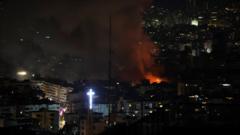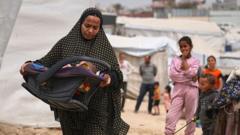The UN Security Council's recent proposal for a ceasefire in Gaza has been vetoed by the US, highlighting a stark divide in international perspectives on the ongoing crisis.
US Blocks UN Resolution for Ceasefire in Gaza Amid Humanitarian Crisis

US Blocks UN Resolution for Ceasefire in Gaza Amid Humanitarian Crisis
The US has vetoed a UN proposal for an immediate ceasefire in Gaza, citing concerns over Hamas, while other nations push for humanitarian aid.
In a significant move, the United States has exercised its veto power against a UN Security Council resolution that called for an "unconditional and permanent" ceasefire in the Gaza Strip. Despite the resolution receiving support from all 14 other council members, US Ambassador to the UN Dorothy Shea articulated that such a measure would compromise diplomatic initiatives aimed at achieving peace. She emphasized that without a condemnation of Hamas and an insistence on its disarmament, the US could not support the resolution. This is particularly vital given that Hamas, which the US, UK, and EU classify as a terrorist organization, has been central to the conflict.
The backdrop of the veto is a pressing humanitarian crisis in Gaza, where reports indicate that over two million individuals are at risk of starvation due to restrictions on aid deliveries. For 11 weeks, a total Israeli blockade had severely limited the transportation of essential supplies, igniting widespread concern among international observers regarding the dire situation on the ground.
In light of these conditions, humanitarian efforts have shifted to organizations like The Gaza Humanitarian Foundation (GHF), backed by Israel and the US, which is now managing aid distribution in the region. However, the transition has not been without complications. Recent incidents have put the safety of aid routes in jeopardy, raising alarms about the efficacy and security of aid operations.
The stance of the UK, which voted in favor of the draft resolution, contrasts sharply with that of the US. UK Ambassador Barbara Woodward stressed the urgency of addressing the "intolerable situation" in Gaza, urging for an immediate ceasefire as a pathway to a sustainable political resolution. She called for Israel to lift its stringent aid restrictions, allowing humanitarian organizations to operate freely to alleviate the suffering of civilians.
Since the escalation of violence following Hamas' attacks on October 7, 2023, which resulted in approximately 1,200 Israeli fatalities and many hostages, the conflict has claimed an immense toll on Gaza as well. The territory's health ministry reports that over 54,000 people have died due to the ongoing military campaign and renewed offensives.
The US veto and differing international responses underscore the complexities of navigating humanitarian needs while addressing security concerns in a rapidly evolving conflict.
The backdrop of the veto is a pressing humanitarian crisis in Gaza, where reports indicate that over two million individuals are at risk of starvation due to restrictions on aid deliveries. For 11 weeks, a total Israeli blockade had severely limited the transportation of essential supplies, igniting widespread concern among international observers regarding the dire situation on the ground.
In light of these conditions, humanitarian efforts have shifted to organizations like The Gaza Humanitarian Foundation (GHF), backed by Israel and the US, which is now managing aid distribution in the region. However, the transition has not been without complications. Recent incidents have put the safety of aid routes in jeopardy, raising alarms about the efficacy and security of aid operations.
The stance of the UK, which voted in favor of the draft resolution, contrasts sharply with that of the US. UK Ambassador Barbara Woodward stressed the urgency of addressing the "intolerable situation" in Gaza, urging for an immediate ceasefire as a pathway to a sustainable political resolution. She called for Israel to lift its stringent aid restrictions, allowing humanitarian organizations to operate freely to alleviate the suffering of civilians.
Since the escalation of violence following Hamas' attacks on October 7, 2023, which resulted in approximately 1,200 Israeli fatalities and many hostages, the conflict has claimed an immense toll on Gaza as well. The territory's health ministry reports that over 54,000 people have died due to the ongoing military campaign and renewed offensives.
The US veto and differing international responses underscore the complexities of navigating humanitarian needs while addressing security concerns in a rapidly evolving conflict.





















